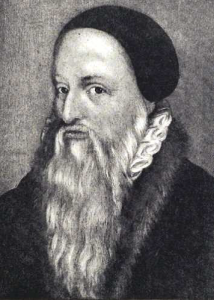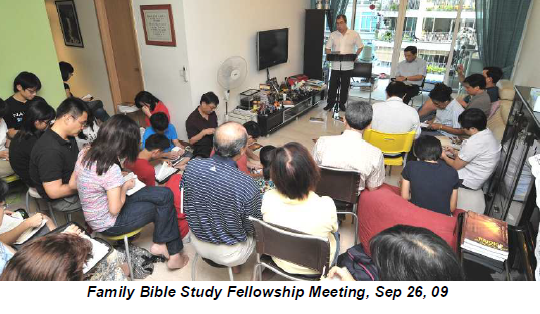Theodore Beza: Calvin’s Successor in the Protestant Reformation
Rev Dr Jeffrey Khoo
Theodore Beza (1519-1605) was without dispute Calvin’s successor in Geneva. He championed Calvin’s theology and was the chief spokesman of Reformed Protestantism. If Calvin was the architect of Reformed theology, then Beza would be the engineer who expounded further and defended the tenets of the Reformed Faith
His Birth and Upbringing
Theodore Beza was born into a rich and distinguished family in France. He was the youngest child in a family of seven children. Soon after he was born, his mother died. His uncle Nicolas who was a member of parliament in Paris took a liking for him, and adopted and raised him in Paris. Under Nicolas, the child received the best education money could buy. Theodore excelled academically and displayed such scholarly promise that he was sent to study under Melchior Wolmar—the famous Greek scholar at Orleans—who had also taught John Calvin. This happened when Beza was only nine years old and he studied under Wolmar for seven years. The Lord in His providence was preparing Beza to undertake the editorial work on the Greek New Testament that was started by Erasmus and Stephanus. The 1598 edition of Beza’s Greek New Testament was the text used primarily by the King James translators to produce the Authorised Version of the Bible.
It is significant to note that Wolmar had earlier on converted to the Protestant Faith, believing that justification was by the grace of God alone through faith alone in Christ Jesus alone. Wolmar not only taught the young Beza Greek, but also preached the gospel to him. Beza also learned much about the doctrinal and moral corruptions in the Roman Catholic Church and personally witnessed how that Church ruthlessly executed those who differed from her teaching.
When it was time for Beza to enter the University, he was sent to the University of Orleans to study law in the hope that he would follow the steps of his uncle Nicolas who was a prominent lawyer. Beza pursued his studies with great industry and succeeded in earning his law degree at the age of 20. His father was eager for him to further his studies in law but his heart was directed to the humanities especially the study of the writings of the Reformers.
His Ministry in Geneva
Beza gave his life to serve the Lord Jesus Christ when he fell very ill and was at the brink of death. This happened when he was about 28 years old. He felt that he had been living a hypocritical life by enjoying the financial benefits secured for him by his uncle Claudius who was an Abbot of a Catholic monastery when he was at heart a Protestant. At a time when death was staring at his face, he began to realise the vanity of worldly pursuits with all its honours and rewards. He felt the Lord calling him to give his life to do something of eternal value and worth. The Lord spared his life, and he left France and crossed over to Switzerland and entered the city of Geneva in 1548. There he met John Calvin and became a member of the Reformed Church.
Calvin took a special interest on Beza, and saw in him a great potential for the service of the Church. There was an occasion when Beza fell sick which caused Calvin to worry. Writing to William Farel in 1551 after having known Beza for about two years, Calvin said, “I would not be a man if I did not return his love who loves me more than a brother and reveres me as a father but I am still more concerned at the loss the church would suffer if in the midst of his career he should be suddenly removed by death, for I saw in him a man whose lovely spirit, noble, pure manners, and open-mindedness endeared him to all the righteous. I hope, however, that he will be given back to us in answer to our prayers.” The Lord answered Calvin’s prayer. Beza recovered and became increasingly prominent in the defence of the Reformed Faith.
In 1557 when the Waldenses were persecuted for their faith, Beza was called upon to defend the Waldenses in court. On another occasion, 400 Protestants who quietly gathered together to hold a worship service were pounced upon by an unruly mob and falsely charged, and cast into prison. Beza was again found in court to plead for the Protestants. For his good works for the cause of the Reformation, the Protestants began to hold Beza in high regard.
When the city of Geneva decided to establish an Academy, Calvin invited Beza to be its Greek Professor. Beza was only too delighted to oblige for he had always desired to labour at the side of Calvin. In 1559 when the Academy was opened, Beza was installed as Rector; he was 40 years old. This was a significant milestone in his life. From then onwards, he became Calvin’s most able assistant in the promotion and defence of the Reformed Faith. Under his care, the Geneva Academy flourished and grew from strength to strength.
Calvin was a man plagued with ill health throughout his life. That he was able to accomplish so much despite his health and his relatively short life can only be due to the grace and power of God. In his final days, knowing that the time of his departure was at hand, Calvin relied on Beza more and more to get his work done. The friendship between the two was never broken. Calvin trusted Beza fully and Beza respected Calvin greatly. Calvin had no doubt that Beza should succeed him in Geneva. When Calvin finally passed away in 1564, Beza conducted the funeral and shortly after wrote a biography of Calvin. The city of Geneva elected Beza to succeed Calvin. He continued in the work that Calvin left behind, teaching at the Academy, preaching in the churches, advising the city council, writing to expose the heresies of false teachers and providing refuge for those who fled persecution from France and other countries. Commenting on Beza as Calvin’s successor, Church historian Philip Schaff said, “Nor could this leadership have fallen into better hands. For Beza, although inferior to Calvin in theological acquirements and acumen, was his superior in knowledge and experience of court life and in grace of manner. He was eminently fitted to be the host of the Protestant scholars and martyrs, who flocked or fled to Geneva from every quarter. And so the theological school became under him the most famous of its kind in the world, and the little republican city was the virtual capital of Continental Protestantism.”
His Faithfulness unto Death
Beza generally enjoyed good health and strength during his years of ministry in Geneva. As he grew older, his health and strength gradually deserted him. In 1586, when he was 67 years old, he stopped preaching daily, and only preached once a week on the Lord’s Day. In 1598, at the age of 79, he retired from the Academy and sold his library and gave the proceeds to his immediate family and to the poor. In the year 1600, he preached his last sermon, and according to Schaff, the only one preached in the 17th century by a 16th century reformer. In 1597, the Roman Catholic Church tried to tempt Beza to return to her fold. The pope offered Beza 4000 gold crowns per year as his pension, twice the value of all that he owned! Beza dismissed the pope by telling him, “Go away Sir, I am too old and too deaf to hear what you say.” The pope then spread rumours that Beza had capitulated before he died, but these lies were easily and quickly dispelled. On the Lord’s Day, 13 October 1605, Beza died a faithful successor of Calvin, and not a traitor of the faith as the Roman Catholic Church was desperate to have people believe.
Praise the Lord for raising up good and faithful successors to uphold and defend the Christian Faith. Moses had Joshua for a successor, Elijah had Elisha, Paul had Timothy, Luther had Melanchthon, Zwingli had Bullinger, Calvin had Beza, Carl McIntire had Timothy Tow. Will our sons defend the faith or will they betray the faith? We must pray for our next generation, for our children and our children’s children, that they will defend the good old Book and proclaim the old-time Faith until the Lord Jesus Christ returns. Let us heed the injunction of the Apostle Paul, “And the things that thou hast heard of me among many witnesses, the same commit thou to faithful men, who shall be able to teach others also” (2 Tim 2:2).
A Bible Student’s Prayer
John Knox
Out of the 119th Psalm – Wherein shall the Child address his way? In guiding himself according to thy word? Open mine eyes, and I shall know the marvels of thy Law. Give me understanding, and I shall keep thy Law, yea I shall keep it with mine whole heart. Lord, which art the fountain of all wisdom and knowledge, seeing it hath pleased thee to give me the means to be taught in my youth, for to learn to guide me godly and honestly all the course of my life; it may also please thee to lighten mine understanding (the which of it self is blind), that it may comprehend and receive that doctrine and learning which shall be taught me: it may please thee to strengthen my memory to keep it well; it may please thee also to dispose mine heart willingly to receive it with such desire as appertaineth, so that by mine ingratitude, the occasion which thou givest me, be not lost. That I may thus do, it may please thee to pour upon me thine Holy Spirit, the Spirit, I say, of all understanding, truth, judgement, wisdom, and learning, the which may make me able so to profit, that the pains that shall be taken in teaching me be not in vain. And to what study so ever I apply my self, make me, O Lord, to address it unto the right end: that is, to know thee in our Lord Jesus Christ, that I may have full trust of salvation in thy grace, and to serve thee uprightly according to thy pleasure, so that whatsoever I learn, it may be unto me as an instrument to help me thereunto. And seeing thou dost promise to give wisdom to the little and humble ones, and to confound the proud in the vanity of their wits, and likewise to make thyself known to them that be of an upright heart, and also to blind the ungodly and wicked; I beseech thee to fashion me unto true humility, so that I may be taught first to be obedient unto thee, and next unto my superiors, that thou hast appointed over me: further that it may please thee to dispose mine heart unfeignedly to seek thee, and to forsake all evil and filthy lusts of the flesh: And that in this sort, I may now prepare my self to serve thee once in that estate which it shall please thee to appoint for me, when I shall come to age.




